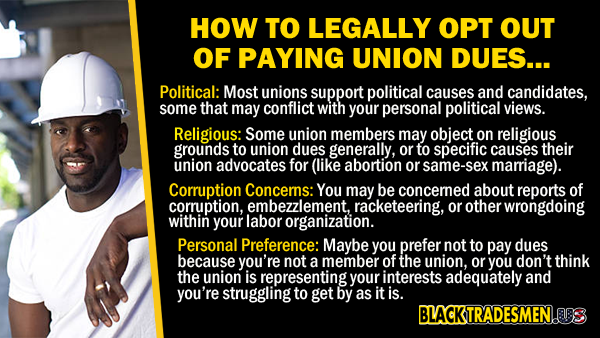
There are many labor unions that represent the interests of millions of workers in the U.S. While many labor unions fight for improved wages, benefits, and working conditions, there are also laws to protect the rights of individual union members and to guard against corruption within the labor organization itself. Some of these laws relate to an employee’s right to opt out of the fees unions charge for their services. Read on to learn more about these laws and how to stop paying union dues if you’ve chosen to opt out.
Reasons to Opt Out
of Paying Union Dues
Using a process of collective bargaining, unions work to
negotiate better terms and working conditions for workers in various
industries. To pay for the costs of these services, unions charge fees that you
might have to pay whether you’re a card-carrying union member or not. However,
more and more workers are realizing that they might not have to pay all or part
of these dues depending on the laws that apply to them.
The reasons for
opting out of paying dues vary, but might include any of the following:
Political: Most
unions support political causes and candidates, some that may conflict with
your personal political views.
Religious: Some
members may object on religious grounds to union dues generally, or to specific
causes their union advocates for (like abortion or same-sex marriage).
Corruption Concerns:
You may be concerned about reports of corruption, embezzlement, racketeering,
or other wrongdoing within your labor organization.
Personal Preference:
Maybe you prefer not to pay dues because you’re not a member of the union, or
you don’t think the union is representing your interests adequately and you’re
struggling to get by as it is.
How to Stop Paying
Union Dues: Right to Work States
Over half of the states have what are called “right to work”
laws. These laws usually state that union membership and the payment of union
dues can’t be required conditions of employment. Therefore, in these states,
unions and employers can’t sign contracts where they agree to only hire union
workers, or where they require the automatic deduction of union dues from their
employees’ paychecks.
So, if you live in a right to work state and you wish to
stop paying dues, you should notify the union and your employer in writing that
you are canceling your payment of dues. If you
signed something authorizing your employer to automatically deduct dues from
your paycheck, you may only have a small window of time each year to revoke
this authorization. Check with your union to determine what that time frame is.
CLICK HERE FOR SAMPLE OBJECTION LETTER TO OPT OUT OF PAYING DUES
How to Stop Paying
Union Dues: Other States
Regardless of where you live, the Supreme Court has ruled
that you can resign union membership at any time. However, if you don’t work in
one of the right to work states discussed above, unions can still force you to
pay fees similar to union dues (often called “agency fees”), even if you are
not a union member. This is because all employees benefit from collective
bargaining agreements, regardless of union membership status. Despite all of
that, you may still have a right to pay reduced fees.
For example, you can object to fees that are used for
anything unrelated to the costs of collective bargaining, such as political
campaigns or the advancement of causes that are against your religion. In these
cases, theunion may only charge you for your share of the costs of collective
bargaining. To pay the reduced fee, send a letter to the union stating that you
object to paying for more than your share of the collective bargaining
expenses, and request a copy of the union’s procedural requirements for opting
out of these fees.
CLICK HERE FOR SAMPLE OBJECTION LETTER TO OPT OUT OF PAYING DUES
Additionally, because Title VII of the Civil Rights Act of
1964 prohibits workplace discrimination based on religion, you may also be able
to decline union membership and the payment of fees based on your sincerely
held religious beliefs. Many state laws include such opt-out provisions, which
let you divert your fees to certain types of charities instead.
Know and Defend Your
Rights with the Help of an Attorney
There are many labor laws designed to protect the rights of
employees, but knowing which ones apply to you is often confusing.
Additionally, the windows for lodging objections or filing a complaint against
a union or employer can be very narrow. Whether you’re wondering how to stop
paying union dues, or you need help defending your other rights as an employee,
contact a local labor attorney who can guide you in the right direction.
